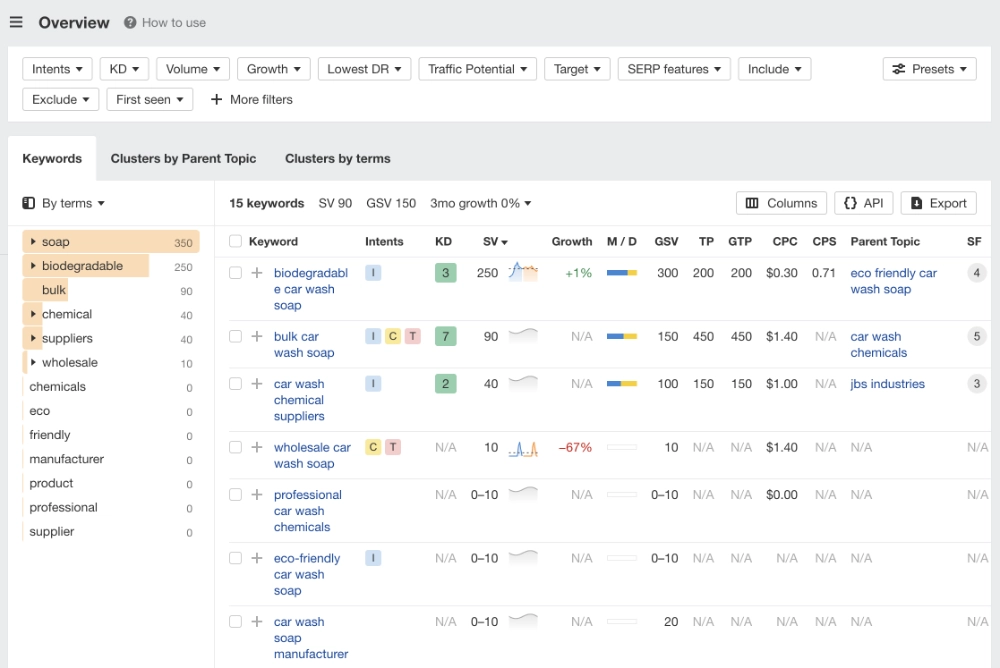Did you know a lack of topical authority is the biggest hurdle to ranking on the first page of Google?
According to Search Engine Journal, a recent study of 253,800 search engine results concluded that “page-level topical authority is the largest on-page ranking factor“ for a webpage’s rank position in a Google search.
If you’re struggling to get your business seen on Google, there’s a huge chance it’s because Google doesn’t view you as more authoritative on the subject than your competition.
How do we fix that?
With a solid automotive SEO content strategy.
You want to pick a primary niche topic and start publishing sub-topic content that branches off of that.
In this help article, we’ll explain topical authority, run through keyword research, planning a content calendar, creating high-quality content, and other tips for success in establishing authority in your field.
Let’s dive in.
1. What is Topical Authority and Why Does It Matter?

Google’s primary objective is to give its users exactly what they’re looking for. In order to do that, Google prioritizes the most relevant, helpful, and trustworthy content in relation to your search.
Relevant and helpful are relatively easy to figure out.
But how do you become trustworthy in Google’s eyes?
With topical authority.
If you’re positioning your business as an expert in luxury detailing products, your website needs to be full of content about all the various aspects of luxury detailing products and their use if you want to show up in the search rankings.
Google will recognize you as an authority on the subject when it finds the relevant keywords and topics it expects to find on your site.
Topical authority is how search engines determine whether your website is a trusted expert on a specific subject.
Think of it as Google’s way of asking, “Does this site know what it’s talking about?”
If your site consistently publishes high-quality, in-depth content around a central theme—like luxury detailing products—Google begins to associate your site with that topic and sees it as a reliable source for searchers.
This trust helps your site rank higher in search results because Google knows it can confidently recommend your content to users.
Unsure How to Write a Blog on WordPress? Get Your FREE Step-by-Step Guide Below ⬇️!
Impact: Why Topical Authority Improves Rankings
Building topical authority is one of the most effective ways to improve your rankings on Google. This is directly tied to Google’s emphasis on E-E-A-T principles—Experience, Expertise, Authoritativeness, and Trustworthiness.
Consider this: a study from Backlinko analyzed over 11 million Google search results and found that content depth and relevance were among the top factors influencing first-page rankings.
Websites that dive deep into a single topic, addressing user searches with clarity and expertise, significantly outperform those that skim the surface.
Simply put, Google rewards sites that demonstrate they truly know their stuff—and topical authority is how you prove it.
This trust helps your site appear more frequently in organic search results, which is crucial for attracting highly motivated customers.
Relevance to Automotive Businesses
Automotive businesses operate in a fiercely competitive online space, where ranking on the first page can make or break your ability to attract customers.
Topical authority becomes your competitive edge because it enables you to stand out in a crowded marketplace by becoming the definitive resource for your niche. Effective search engine optimization (SEO) techniques are essential for building this authority and improving your online visibility.
Search engines prioritize content-rich, authoritative websites, especially in industries where consumers are doing detailed research before making decisions—like automotive supplies, detailing services, manufacturing or supply partners, and other B2B partnerships.
For example, if you’re a car detailing supplier and your site publishes in-depth guides on The Science of Car Wax, The Best Techniques for Ceramic Coating Application, Ideal Chemical Composition for Specific Applications, or How to Fix Common Detailing Mistakes, Google is much more likely to rank your site above a generic e-commerce store that just lists products.
By strategically developing content that educates and informs, you establish trust not just with Google, but with your audience. Over time, this trust translates into higher rankings, more traffic, backlinks, and—most importantly—more leads and sales.
2. Foundation of Topical Authority: Keyword Research & Topic Clustering for Search Engine Optimization

Okay, let’s get into the nitty-gritty.
Your first step in establishing topical authority will be thorough keyword research and a well-planned SEO strategy, including topic clustering.
Keyword research is not tricky. But it does require data access.
Using tools like aHrefs, SEMRUSH, SEO Arcade, Surfer SEO, or even Google Trends are going to be tremendously helpful in deciding what keywords to target.
Think of a target keyword as the main topic of a particular page as well as the search term that a user puts into a search engine that you want to show up for, preferably in position one.
When choosing a target keyword for your content strategy, you want to look for something with a decent monthly search volume and a keyword difficulty your site can tackle.
For example, if you run an aluminum alloy supply business for the auto industry a keyword like “aluminum alloy” is far too broad and difficult to compete with.
You’d be competing with the likes of Wikipedia, the nation’s top suppliers, and even some government sites.
If your goal is to attract auto industry clients, niching down is going to be your best move.
Pivot to a keyword such as “Aluminum Alloy Supplier” is going to properly represent your business and match the search intent for your ideal client.
In our method at Tyler Linn Media, we generally recommend writing your primary topic page, in this case, a page dedicated to Aluminum Alloy Supply, and getting that established on the site as soon as possible.
It is not going to rank.
… yet.
But don’t worry. If you follow your content map, it won’t be long before it does.
From here, we niche down further for your subtopics and start planning content.
Target Keyword Examples:
- Lightweight Aluminum Alloy Supplier
- Applications of Aluminum Alloys in Automotive Manufacturing
- Lightweight Aluminum Alloys for Electric Vehicles
- Corrosion-Resistant Aluminum Alloys for Automotive Applications
- Aluminum Alloy Standards and Certifications Explained
- Custom Aluminum Extrusions for Automotive Components
- 6000 vs 5000 Series Aluminum Alloys
- Pros & Cons of Aluminum Alloys
- How to Choose the Right Aluminum Alloy for Automotive Parts
See how these subtopics go in-depth and signify you know a little something about your industry?

Google wants to see that.
Your ideal customer wants to see that.
Take this list of subtopics, link them back to your Aluminum Alloy Supply page, and boom!
You’ll be ranking for Aluminum Alloy Supply searches on Google pretty soon.
This process is referred to as topic clustering in the SEO world.
Build your “Pillar Page” then start writing high-quality, relevant, helpful content like crazy and build up a library of “Sub-Topic Pages”.
It’s a lot of work.
But it will get you showing up on search engine results pages.
3. Creating High-Quality Content That Drives Authority
So, what does “high-quality content” really mean?
It’s not just about filling pages with words—it’s about providing real value. High-quality content is deep, accurate, and packed with actionable insights that your target audience can actually benefit from. When it comes to digital marketing, high-quality content is a cornerstone for engaging potential customers and enhancing online visibility.
What Makes Content High-Quality?
The truth is, Google loves long-form, in-depth content.
According to Backlinko, the average word count for pages that rank on the first page of Google is 1,447 words.
Why?
Because detailed content naturally answers more questions, provides more context, and keeps readers engaged longer.
For automotive businesses, this means diving deep into your subject matter.
Are you selling aluminum alloys for electric vehicles?
Write about their applications, benefits, and even their limitations. Prove that you know the ins and outs of your niche better than the next guy.
Types of Content That Work for Automotive SEO
To stand out, focus on formats that not only educate but also build trust:
- Comprehensive Guides: Think “Everything You Need to Know About Lightweight Aluminum Alloys for EVs.” Cover every angle, from specifications to industry use cases.
- Webpages: Optimize your service and product pages to provide in-depth, actionable information tailored to client needs while highlighting your unique offerings.
- Blogs: Regularly publish posts addressing client questions or discussing industry news and events, such as “The Latest Advancements in Carbon Fiber for Auto Manufacturing” or “How Supply Chain Changes Are Impacting Aluminum Alloy Availability.”
- Case Studies: Showcase real-world success stories of how your products or services solved a problem or improved efficiency.
- FAQs: Address common customer concerns like “What’s the difference between 5000 and 6000 series aluminum alloys?” or “How does aluminum compare to steel in auto manufacturing?”
The goal is to create content that feels tailored to your audience’s specific needs while subtly showcasing your expertise.
Practical Tips for Content Success
Fluff is the enemy of high-quality content. Every sentence should serve a purpose. To really stand out:
- Include data and statistics to back up your claims.
- Add graphs, tables, or charts to make complex information digestible.
- Use multimedia like product images, automotive photography, videos of your manufacturing process, or infographics explaining material properties.
- Ensure your content is optimized for mobile devices, as a significant portion of searches are conducted on these platforms.
This not only enhances the user experience but also keeps visitors on your site longer, signaling to Google that people like your content and it’s worth ranking.
The E-E-A-T Principles: A Must for Authority
Google’s E-E-A-T framework (Experience, Expertise, Authority, Trust) is critical for SEO success:
- Experience: Share real-world examples, whether it’s a client testimonial or a specific use case for your product.
- Expertise: Show you know your industry inside and out. Technical knowledge, certifications, and in-depth explanations work wonders.
- Authority: Cite reputable sources or highlight industry partnerships to prove credibility.
- Trust: Be transparent and ensure accuracy—nothing damages credibility like outdated or incorrect information.
Pro Tip: Repurpose Your Content to Dominate Search Engine Results Pages
Don’t let your hard work be a one-and-done task.
That long-form guide? Break it into separate blog posts, social media tips, or email newsletters. One piece of content can drive value across multiple channels, maximizing its impact.
And don’t forget to link back to the original content.
With consistent content generation like this, your business won’t just rank—it will dominate.
4. Building a Content Calendar for Your Automotive Business

Staying consistent with your content will be a challenge without a plan.
A well-organized content calendar helps you stay on track, keep your audience engaged, and build trust with search engines.
Why a Content Calendar Is Essential
Search engines love websites that regularly publish fresh, high-quality content.
By staying consistent, you signal to Google that your site is active and relevant.
For your readers, it’s about reliability—if they know you’re consistently delivering valuable insights, they’re more likely to return.
Over time, this builds both audience trust and topical authority.
How to Plan Your Automotive SEO Content Calendar
Planning your calendar doesn’t have to be complicated. Follow these steps to make the process seamless:
- Identify High-Impact Topics:
Start with keyword research to uncover topics with decent search volume and manageable competition. For instance, if you’re an automotive detergent manufacturer, topics like “Best soaps for car show season” just before Spring could draw in your target audience while showcasing your expertise. - Balance Long-Form and Quick-Hit Content:
Not every post needs to be a 2,000-word guide. Mix in shorter pieces like FAQs or quick tips to maintain variety and keep the momentum going without burning out your resources. Just make sure it’s useful content. - Prioritize Evergreen Content:
Try to keep most of your content focused on topics that will stay relevant over time. A piece about “The Benefits of Corrosion-Resistant Aluminum Alloys” will drive traffic for years, unlike a trend-focused article that will eventually fade into obscurity.
Example Content Calendar for a Carbon Fiber Supplier
Here’s what a month’s worth of content might look like for a Carbon Fiber Performance Parts Manufacturer:
- Week 1: How to Choose the Right Carbon Fiber Hood
- Week 2: The Science Behind Carbon Fiber Strength: Why It’s Ideal for Performance
- Week 3: 5 Myths About Carbon Fiber in Automotive Performance, Debunked
- Week 4: Carbon Fiber vs. Forged Composites: Which Material Delivers Superior Performance?
Each topic is tailored to your audience, answers their questions, and helps you build authority in your niche.
Practical Tools to Keep You Organized
A content calendar is only as good as the system you use to manage it. Here are a few tools that can simplify your workflow:
- Trello: A visual board-style tool that lets you organize posts by stages like “Planning,” “Writing,” and “Published.”
- Airtable: Combines spreadsheet functionality with database features, making it easy to track deadlines, keywords, and topics.
- Google Sheets: A free, simple option for businesses just getting started. Create columns for publish dates, topics, keywords, and content types.
Pro Tip: Build Flexibility Into Your Content Plan
Even the best plans need wiggle room. Leave a couple of slots open each month to respond to timely industry news or trending topics.
Have some backup posts ready to go for times you might not be able to right so you stay on track.
With a solid content calendar, you won’t just create content—you’ll create momentum. And that’s how you keep both search engines and your audience coming back for more.
Bonus Tip: Things to Avoid When Building Topical Authority for Automotive Businesses
Mistake #1
As mentioned above, a frequent misstep is publishing content inconsistently.
Sporadic updates signal to search engines—and potential customers—that your site may not be reliable. Create a content calendar and stick to it. Even a steady flow of one high-quality article per month can make a difference.
Mistake #2
Another challenge is targeting overly broad or highly competitive keywords.
While aiming for high-traffic terms seems logical, it often results in frustration. Instead, niche down to long-tail keywords specific to your audience. For example, instead of “carbon fiber,” target “carbon fiber aftermarket bumpers.”
Mistake #3
Finally, don’t neglect technical SEO.
Slow page load times, broken links, or poor mobile optimization can sabotage even the best content. Tools like Google Search Console or PageSpeed Insights can help you identify and fix these issues.
Topical Authority Checklist (Free Download ⬇️)
Remembering all the best practices for your automotive SEO strategies can be hard.
So, I made you this Topical Authority Checklist. It’s a single page and covers all the basics to help you quickly run through the process without forgetting anything.
It addresses Keyword Research, Content Planning & Strategy, and Quality Content Creation.
You can also use this checklist to audit your existing content and see if it’s up to snuff.
Conclusion: Drive Your Business to the Top with Topical Authority
Topical authority isn’t just a buzzword—it’s a literal roadmap to standing out in the competitive automotive industry.
By focusing your energy on strategic keyword research, crafting high-quality, targeted content, and maintaining consistency with a well-planned content calendar, your business can achieve increased visibility, higher search rankings, and long-term customer trust.
An effective automotive SEO content strategy ensures you’re not just another voice in the crowd but a trusted resource your audience turns to for answers.
Whether you’re manufacturing carbon fiber performance parts or supplying other automotive solutions, building topical authority establishes your brand as a leader in the field.
If implementing these strategies feels overwhelming, Tyler Linn Media is here to help. If you’re interested in outsourcing your content creation or partnering with our SEO specialists to streamline the process and ensure consistent results, we’ve got you covered.
Give us a call or reach out through our contact form today. We’ll help you rank higher and build a foundation for sustainable growth.
Wanna learn more about automotive marketing? Check out our blog.
